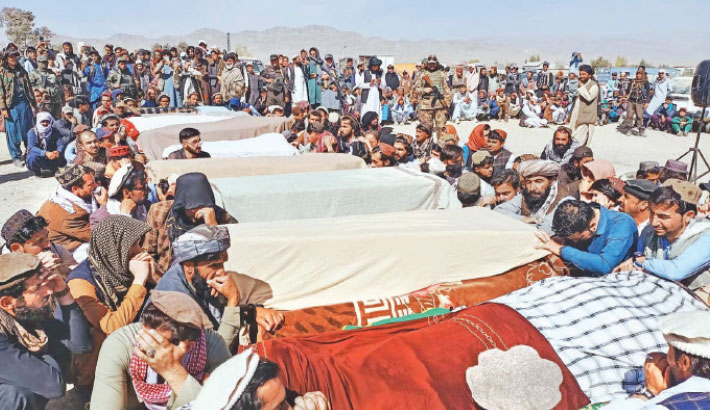
Afghanistan is once again treading a familiar and perilous path, where its territory is not merely becoming a strategic playground for regional powers, but its own sovereignty is gradually eroding. Recent signals—the deployment of anti-aircraft weaponry by Taliban fighters in Pakistan’s border, Afghan military incursions along the border, and simultaneous diplomatic and military coordination with India—all indicate that Afghanistan is being drawn back onto the stage of proxy warfare. History has repeatedly taught us that when a country is utilised for the strategic purposes of external powers, the consequences are prolonged instability, humanitarian disaster, and deep disruption of regional security.
During the 1980s, with the Soviet invasion, Afghanistan first became a board on the chess game of proxy wars. In subsequent decades, the interventions of the United States and its allies once again transformed the country into a multinational strategic theatre. In every instance, it was the Afghan people who suffered the most. Homelessness, insecurity, economic collapse, and social decay occurred. Refugee flows did not remain confined within Afghan borders; they spread across South Asia, particularly affecting the social and economic balance of Pakistan, Iran, and Central Asian nations.
In the current scenario, Afghan territory is being leveraged in coordination with India as a strategic instrument against Pakistan—posing a direct threat not only to Afghanistan’s political and military autonomy but also undermining regional stability. The simultaneous presence of the acting Taliban foreign minister in Delhi and attacks along the Pakistan border provides direct evidence of this process. Intelligence reports from Islamabad suggest that Afghanistan is once again being ensnared in a strategic game, which will ultimately weaken Afghan sovereignty and destabilise the region.
When Afghanistan’s sovereignty is compromised, it is not only the country itself that suffers; the entire South Asian region bears the consequences. International donors and investors hesitate to engage with a state where the government lacks independent decision-making and functions instead as a pawn in the strategic game of foreign powers. This creates paralysis in economic reconstruction, infrastructural development, and social support systems. Distrust in the government among citizens and societal discontent intensify, accelerating the spread of extremist ideologies and militant networks.
The implications for Pakistan are equally grave. Managing conflict on the western border drains military and economic resources, weakens internal stability, and diminishes reactive capacity on the eastern border. When Pakistan is stretched across two fronts, India gains strategic advantage. Such a scenario can permanently weaken South Asia’s long-term security architecture.
Turning Afghanistan into a theatre of proxy warfare exacerbates not only political and military problems but also humanitarian and economic catastrophes. Local populations are forced to flee, education and healthcare systems collapse, and economic activities come to a standstill. Consequently, society’s most vulnerable segments are drawn towards criminality and radicalisation.
From a strategic perspective, when a region is used as a tool against another country, it undermines the region’s independent diplomacy and prospects for lasting peace. Solutions in proxy conflicts are never permanent; cycles of retaliation, diplomatic disruption, and recurrence emerge. Therefore, strategic restraint and multilateral diplomacy are urgently needed to manage the situation. First, Afghanistan’s autonomy and sovereign decision-making must be internationally safeguarded. Second, border security and intelligence sharing must be strengthened to minimise misperceptions and misinformation.
Third, multilateral platforms must actively participate in conflict mitigation and reconstruction, seeking political and economic solutions without military escalation.
The media’s role is also crucial. Misleading or false reporting that diverts international attention exacerbates the politicisation of real events. Neutral investigation and evidence-based discourse are essential for resolving the crisis.
Afghanistan’s long history demonstrates that the consequences of proxy wars are never confined to a single country. From the Soviet intervention of the 1980s to the post-2001 US and NATO presence, Afghan territory has repeatedly been transformed into a strategic battleground. In every instance, the local population suffered the most. Refugee flows, the spread of militant networks, radical ideologies, and economic collapse serve as enduring examples. These issues are not just Afghanistan’s concern; they create persistent crises for neighbouring countries as well.
For Pakistan, this is particularly perilous. Managing border pressures depletes military readiness, internal stability, and economic resources. Increased strain on the eastern border undermines strategic balance with India. While this may provide India a short-term strategic advantage, in the long term it poses a severe threat to regional stability.
Regionally, if Afghanistan is used as a proxy, South Asia’s trade, connectivity, diplomacy, and security are all compromised. Refugee crises, terrorist networks, border conflicts, and economic disruption produce long-term instability in the region. The international community may intervene, but solutions are rarely sustainable because the nature of proxy wars is inherently cyclical.
Militarily, Pakistan becomes fatigued managing two fronts. Resources and attention expended on the western border hinder effective management of the eastern front, reducing the country’s military and strategic capabilities, while neighbouring powers may exploit the situation. Diplomatically, this creates a complex scenario where solutions are necessary, yet alternative force management becomes difficult.

Ultimately, history teaches us a clear lesson: a nation that allows its territory to be used as a strategic tool by others bears enduring humanitarian, social, and economic costs. If Afghanistan continues down this path, the entire South Asian region will face prolonged instability, conflict, and humanitarian disaster. The only way to prevent this is through strategic restraint, multilateral diplomacy, safeguarding Afghan sovereignty, and coordinated initiatives to ensure regional stability. Ignoring these lessons condemns us to once again witness the prolonged suffering of the Afghan people, border tensions, and cascading economic losses.

